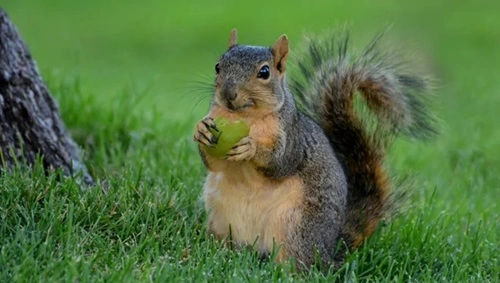Yes, in many parts of Colorado, it is illegal to feed squirrels and other wildlife, as the practice violates state laws aimed at protecting both animals and humans. Feeding wildlife, including squirrels, can disrupt natural behaviors, pose health risks, and lead to increased human-wildlife conflicts. Colorado’s wildlife laws strictly regulate interactions with wild animals to preserve ecosystems and ensure public safety.
The Legal Framework for Feeding Wildlife in Colorado
Feeding wildlife, including squirrels, is governed by the Colorado Parks and Wildlife (CPW) regulations and local ordinances. These laws aim to maintain a balance between humans and wildlife while preventing harm to animals and ecosystems.
1. Colorado State Law
Under Colorado Revised Statutes § 33-6-131, feeding wildlife is prohibited, with certain exceptions for birds and domestic animals. The law broadly addresses feeding any wild animals, including squirrels, to prevent dependency on human-provided food.
2. Colorado Parks and Wildlife Regulations
The CPW prohibits feeding wild animals because it alters their natural foraging behavior and can create dependency. Additionally, feeding squirrels may attract larger predators, such as foxes or coyotes, to urban or residential areas, increasing the likelihood of dangerous encounters.
3. Local Ordinances
Cities in Colorado often enforce additional restrictions:
- Denver: Feeding squirrels and other wildlife is prohibited under Denver municipal codes, with fines imposed for violations.
- Boulder: The city has strict rules against feeding wildlife to protect local ecosystems and prevent overpopulation of certain species.
Why Feeding Squirrels is Prohibited
Feeding squirrels may seem harmless, but it has significant ecological and safety implications:
1. Dependency on Humans
When squirrels become reliant on human-provided food, they lose the ability to forage naturally. This can reduce their survival skills and make them more vulnerable if the food source disappears.
2. Increased Aggression
Squirrels accustomed to being fed by humans may become aggressive, approaching people for food or raiding homes and gardens. This increases the likelihood of bites or scratches.
3. Health Risks
Human food is often unsuitable for squirrels and can cause malnutrition or digestive problems. Additionally, feeding wildlife can spread diseases, such as rabies or plague, which squirrels can carry.
4. Environmental Damage
Overfeeding leads to overpopulation in urban areas, disrupting local ecosystems. It can also attract larger predators, creating safety concerns for humans and pets.
Penalties for Feeding Squirrels in Colorado
Violating Colorado’s wildlife feeding laws can lead to penalties, including:
1. Fines:
- State fines for feeding wildlife, including squirrels, typically range from $50 to $100 per violation. Local fines in cities like Denver and Boulder can exceed $500 for repeat offenses.
2. Warnings or Tickets:
- First-time offenders may receive warnings, but repeat violations often result in tickets.
3. Civil Liability:
- If feeding squirrels results in property damage or wildlife-related injuries, individuals may face civil lawsuits from affected parties.
Legal Alternatives to Feeding Squirrels
Instead of feeding squirrels, consider these alternatives to enjoy wildlife responsibly:
1. Plant Native Vegetation: Native trees and shrubs provide natural food sources, such as nuts and berries, for squirrels.
2. Install a Bird Feeder: While feeding most wildlife is prohibited, feeding birds is generally allowed in Colorado. Choose feeders that discourage squirrels from accessing the food.
3. Observe from a Distance: Enjoy watching squirrels in their natural habitat without intervening in their foraging behavior.
Recent Legal Updates (2023-2024)
1. Enhanced Wildlife Education Programs
Colorado Parks and Wildlife has launched public education campaigns to raise awareness about the dangers of feeding wildlife. These initiatives emphasize the long-term harm to animals and ecosystems caused by human interference.
2. Increased Enforcement
Cities like Boulder and Colorado Springs have ramped up enforcement of wildlife feeding prohibitions, particularly in urban parks and residential areas where squirrel populations are growing.
3. Wildlife Conflict Prevention Initiatives
Colorado has implemented new strategies to reduce human-wildlife conflicts, such as distributing bear-proof trash cans and promoting responsible wildlife observation practices.
FAQs About Feeding Squirrels in Colorado
Q1. Is it illegal to feed squirrels everywhere in Colorado?
Ans: Yes, it is generally prohibited across Colorado, with enforcement varying by location. State law and local ordinances discourage feeding squirrels to prevent ecological and safety issues.
Q2. Can I feed squirrels in my backyard?
Ans: No, feeding squirrels on private property is still subject to state and local wildlife laws. Providing food can attract other wildlife, leading to potential conflicts.
Q3. What happens if I’m caught feeding squirrels?
Ans: You may receive a warning or be fined, depending on the severity of the violation and the local enforcement policies.
Q4. Are there any exceptions to the no-feeding rule?
Ans: Feeding birds is usually permitted, provided it doesn’t attract other wildlife. Always check local regulations to ensure compliance.
Q5. Why are there laws against feeding squirrels?
Ans: Feeding squirrels disrupts their natural behavior, increases dependency on humans, and creates safety risks, including the spread of diseases and attracting predators.

